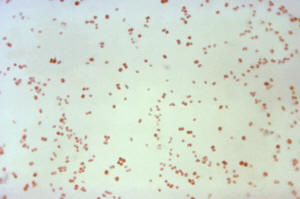Sexually transmitted disease cases fall, but not syphilis in newborns
[September 25, 2025]
By MIKE STOBBE
NEW YORK (AP) — Sexually transmitted disease rates for U.S. adults fell
last year, but syphilis in newborns continued to rise, according to new
government data posted Wednesday.
The Centers for Disease Control and Prevention provisional data for 2024
showed a third consecutive year of fewer gonorrhea cases, and the second
year in a row of fewer adult cases of chlamydia and the most infectious
forms of syphilis.
But congenital syphilis cases, in which infected moms pass the disease
to their babies, aren't seeing the same improvements. Such infections in
infants can lead to deaths or lifelong health problems such as deafness,
blindness, and malformed bones.
The number and rate of newborn cases has been rising since 2012, when
about 300 were reported, and last year rose to nearly 4,000. The 2024
increases was not as steep as in other years — cases were up by less
than 2% from 2023. But health experts say no cases should be happening,
and any growth is worrisome.
"The continued rise in congenital syphilis is a distressing indication
that we are not doing enough to protect pregnant women and newborns,"
said Elizabeth Finley, interim executive director of the National
Coalition of STD Directors, in a statement.
About 1.5 million chlamydia cases, 543,000 of gonorrhea, and more than
190,000 of syphilis were diagnosed and reported last year. Each was
lower than the year before, and the more than 2.2 million total cases
represented a 9% decline from 2023.

[to top of second column]
|

This 1971 microscope photo provided by the Centers for Disease
Control and Prevention shows Neisseria gonorrhoeae bacteria, which
causes the sexually-transmitted disease gonorrhea. (CDC via AP,
File)
 Overall decreases in sexually
transmitted diseases in recent years have a lot to do with a general
decline in young people having new partners, said Dr. Jeffrey
Klausner, an infectious diseases researcher at the University of
Southern California.
But the drop in adult syphilis cases is generally attributed to the
growing use of the antibiotic doxycycline as a morning-after pill,
specifically for gay and bisexual men and transgender women who
recently had an STD diagnosis. Cases of primary and secondary
syphilis, the disease's most infectious stages, fell 22% last year,
the CDC says.
The new data suggests that the improvement in some groups has not
yet played out in obstetrics wards. There are several possible
factors, but one could be that only 80% of pregnant women are
getting screened for syphilis, according to a recent CDC study.
All contents © copyright 2025 Associated Press. All rights reserved |